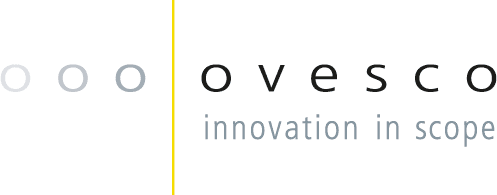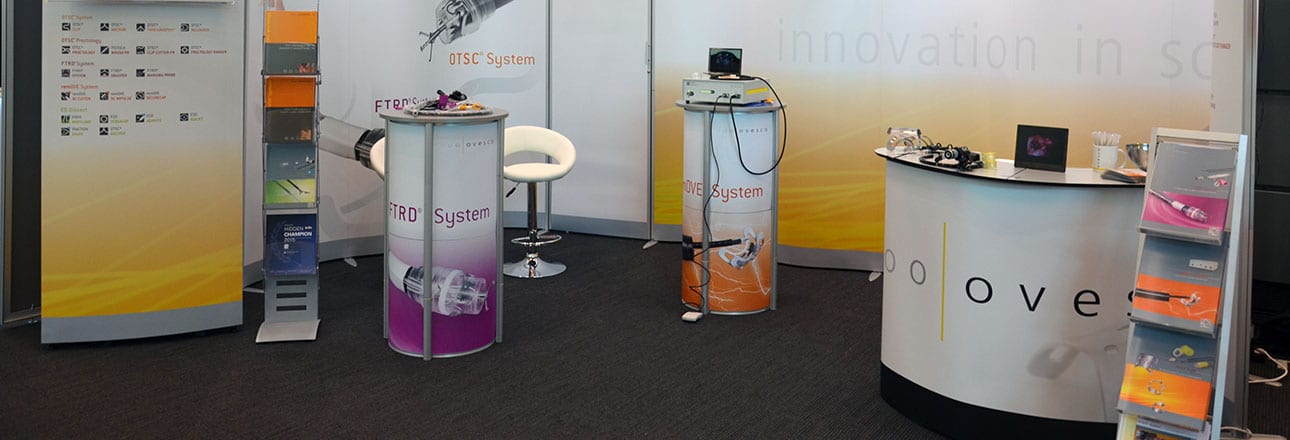Conference of the German Society of Gastroenterology, and Digestive and Metabolic Diseases with Endoscopy Section (DGVS) and the German Society of General Surgery and Visceral Surgery (DGAV): interim-results of the German FTRD registry, “STING” and “FLETRock”-study show significant superiority of OTSC therapy over endoscopic standard techniques in patients with upper GI bleeding
The 72th annual conference of the German Society of Gastroenterology, and Digestive and Metabolic Diseases with Endoscopy Section (DGVS) took place together with the 11th autumn conference of the German Society of General Surgery and Visceral Surgery (DGAV) on September 13-16, 2017 in Dresden, Germany.
Several talks and presentations presented original research with Ovesco technology and procedures. Dr. med. Benjamin Meier (hospital Ludwigsburg) received the DGVS Herrmann Strauss-reward for the presentation of the FTRD register results.
FTRD registry: interim results show R0-resection rate of 79% and complication rate of 8%
The German online FTRD registry was generated to gather multicentric “real life” data on effectivity and safety of the FTRD System. B. Meier and colleagues presented interim results of all data that was registered between 9/2015 and 10/2016. Within this time period, 250 full-thickness resections in 31 centres were documented. Main indications were non-lifting adenoma (49%), early carcinoma (23%), adenoma at the base of the appendix (7%), and subepithelial tumors (6%). 173/250 lesions were located in the colon and 77/250 in the rectum. The median size of the lesions was 20x15mm. Median procedural time was 45 min (5-150 min). R0-resection was achieved in 79% of cases. Complications were documented in 20/250 cases (8%), of which 8 were perforations (3.2%, 5 perforations due to incorrect sequence of the procedure steps) and 7 (2.8%) were bleedings which could be managed endoscopically. Follow-up data was available in 200 cases with a median follow-up time of 10 weeks (0.5-77); in 12% of cases residual or relapse lesions were found. The data of this registry confirm the present study results in a multicentric “real life” setting: endoscopic full-thickness resection with the FTRD System is effective and safe.
Besides, single-center case series with the FTRD from Ludwigsburg and Greifswald were presented at the conference.
“STING”: prospective randomized trial shows significant superiority of OTSC vs standard therapy in recurrent peptic ulcer bleeding
A Schmidt and colleagues, University of Freiburg, presented the randomized controlled STING trial, which shows 84.4% clinical success (= hemostasis and non-recurrence of bleeding for 7 days) in treatment of recurrent ulcer bleeding with OTSC vs 40.6 % with endoscopic standard therapy (p < 0.001).
E Wedi and colleagues, University of Goettingen, presented the FLETRock study, a multi-center study in 118 patients with upper gastrointestinal bleeding (Forrest Ia-IIb). All patients received an OTSC for first-line-therapy (ETO cohort). For comparison the predicted outcome according to the validated Rockall score was used. Treatment with the OTSC significantly reduced the re-bleeding rate in the middle- and high-risk group in comparison to the Rockall Score (4.9 vs 24.0 % in the middle-risk group and 21.4 vs 53.2 % in the high-risk group; p < 0.001). Also the mortality after re-bleeding could be reduced by OTSC therapy (1.7 vs 7.3 % in the middle-risk and 10.9 vs 27.9 % in the high-risk group; p = 0.121 and 0.011, respectively).
B Walter and colleagues presented the application of an additional external working channel (AWC), which can be fixed at the outer margin of a standard endoscope. This allows a new proceeding in polypectomy of large and complex lesions. The additional working channel allows the simultaneous operation with two instruments.
Effektivität und Sicherheit des FTRD-Systems zur endoskopischen Vollwandresektion im Kolorektum – Interim-Ergebnisse des deutschen Online-Registers. Schmidt A, Freiburg, Meier B, Ludwigsburg, Fischer A, Freiburg, Wiedbrauck T und Wegener M, Duisburg, Repp M und Fitzel G, Altenburg, Huebner G, Halle an der Saale, Albers D und Schumacher B, Essen, Kuellmer A, Ludwigsburg, Erhardt A, Wuppertal, Gutberiet K, Delmenhorst, Scholz D und Bielich A, Herford, Caselitz M, Deggendorf, Frieling T, Krefeld, Breidert M, Koesching, Rasch C, Duesseldorf, Fellermann K, Luebeck, Caca K, Ludwigsburg, German FTRD Study Group.
Seltene Ursache einer generalisierten Motilitätsstörung des GI-Traktes – Endoskopische Vollwandresektion mittels FTRD als Diagnostik einer Hypoganglionose bei M. Hodgkin. Huegle U, Sibbing B, Dormann A, Koeln.
Endoskopische Vollwandresektion im Duodenum mit dem Full-Thickness-Resection-Device (FTRD) – eine Fallserie. Bauder M, Cahyadi O, Meier B, Wannhoff A, Schidt A, Caca K, Ludwigsburg.
Endoskopische Vollwandresektion mit dem FTRD im klinischen Alltag, Single-Center Erfahrung bei 17 Patienten. Pickartz T, Simon P, Aghdassi AA, Heidecle CD, Dornbrowski F, Lerch MM, Glitsch A, Greifswald.
Over-the-scope-clips (OTSC) versus endoskopische Standard-Therapie zur Behandlung der Rezidiv-Ulkus-Blutung – eine prospektive randomisierte multizentrische Studie (“STING”). Schmidt A, Ludwigsburg; Gölder S und Messmann H, Augsburg; Goetz M und Kratt T, Tübingen; Meining A und Birk M, Ulm; von Delius S, München; Albert J und Escher M, Stuttgart; Lau J, Hong Kong; Hoffmann A, Wiesbaden; Wiest R, Bern; und Caca K, Ludwigsburg.
Multizentrische Evaluation der endoskopischen Erstlinientherapie der oberen gastrointestinalen Blutung mit dem Over-The-Scope-Clip (OTSC) – FLETRock Study. Wedi E, Göttingen; Hochberger J, Berlin; Fischer A, Freiburg; Jung C, Göttingen; Richter-Schrag HJ, Freiburg.
Endoskopische Therapie von pankreatiko-kolischen Fisteln mittels Over-the-scope-Clip (OTSC): Single-Center Erfahrung und Fallserie. Lünse S, Glitsch A, Simon P, Heidecke CD, Schreiber A, Greifswald.
Erleichterte Großflächenpolypektomie durch die Verwendung eines zusätzlichen externen Arbeitskanals (AWC). Walter B, Ulm; Wedi E, Göttingen; Meining A, Ulm.
For further information see


 Deutsch
Deutsch  Français
Français 